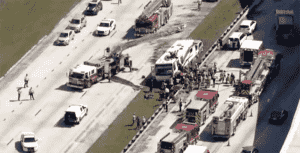
Miami-Dade County courts manage heavy caseloads that affect trial scheduling, and factors like case complexity, discovery requirements, and mediation attempts influence when your case will reach trial.
Court scheduling for Miami car accident trials also depends on numerous factors, including the specific judge assigned, case complexity, and whether all parties are ready for trial.
A knowledgeable Miami car accident lawyer can provide more specific timeline estimates based on current court schedules and help prepare your case efficiently to meet trial deadlines.
Reach out to Anidjar & Levine for your free consultation today
Miami-Dade County Court System Overview
Miami-Dade County Circuit Courts handle personal injury cases through a system designed to manage the high volume of accident litigation filed annually.
Personal injury cases involving damages over $30,000 are filed in Circuit Court, while smaller claims go to County Court with different scheduling procedures.
Cases are randomly assigned to specific judges who manage their own trial calendars and scheduling practices, creating variation in trial timelines. The particular judge assigned to your case significantly influences trial scheduling and case management procedures.
Factors Affecting Trial Scheduling
Multiple factors influence when your car accident case will reach trial, many beyond your direct control. Here are the primary scheduling factors for Miami car accident trial dates:
- Court calendar availability and the judge’s existing trial schedule
- Case complexity, including the number of parties and expert witnesses
- Discovery completion timeline and any pending motions
- Mediation requirements and alternative dispute resolution attempts
- Attorney availability and scheduling conflicts
- Witness availability and expert witness coordination
Cases cannot be scheduled for trial until discovery is complete, including depositions, document production, and expert witness preparation. Efficient case preparation by your legal team can help ensure your case is ready when trial dates become available.
Typical Timeline Progression
Understanding the standard progression in scheduling Miami car accident trial dates from lawsuit filing to trial helps set realistic expectations for your case timeline.
After filing, cases typically have initial case management conferences within 60-90 days to establish scheduling orders and discovery deadlines.
Discovery typically takes 12 to 18 months, with extensions possible for complicated medical issues or multiple defendants.Pre-trial conferences occur 30-60 days before trial dates to address final motions, witness lists, and settlement negotiations.
Case Management Orders
Judges issue case management orders that establish deadlines and scheduling requirements for your specific case. Case management orders set specific deadlines for completing depositions, document production, and expert witness disclosures.
Orders establish deadlines for filing dispositive motions, which must be resolved before trial scheduling can occur. Courts also require certification that cases are ready for trial before assigning specific trial dates to ensure efficient use of court time.
Expedited Trial Procedures
Certain circumstances may allow for expedited trial scheduling in car accident cases. Cases involving elderly plaintiffs, terminal illnesses, or other urgent circumstances may qualify for expedited trial scheduling.
Cases with limited discovery needs and straightforward liability may move through the system faster than complicated litigation. Also, some courts prioritize trial scheduling for cases where good-faith settlement efforts have failed and a trial appears necessary.
Continuance Possibilities
Trial dates may be continued (pushed beyond the scheduled trial date) for various reasons, affecting your expected trial timeline.Medical emergencies, scheduling conflicts with key witnesses, and incomplete discovery may justify trial continuances.
Continued cases often face significant delays in obtaining new trial dates due to court calendar constraints. Also, both parties may have strategic reasons for seeking continuances, though courts discourage unnecessary delays.
Multiple continuances can significantly extend case resolution timelines beyond initial expectations.
Settlement Negotiations During Trial Preparation
Active settlement negotiations often continue throughout trial preparation and may resolve cases before trial occurs.As trial dates approach, both parties face increased pressure to settle due to trial preparation costs and the uncertainty of the outcome.
Many cases settle on the morning of trial or during trial proceedings as parties reassess their positions. Continued settlement efforts mean your case may resolve before reaching the assigned trial date.
Post-Trial Considerations
Understanding post-trial procedures helps you prepare for potential outcomes and timeline extensions.
Jury Deliberation Time
Jury deliberations can last hours or days, depending on the jury’s agreement on the verdict amounts.
Post-Trial Motion Practice
Losing parties may file post-trial motions challenging verdicts, which can extend final case resolution by months.
Appeal Possibilities
Either party may appeal adverse verdicts, potentially extending final resolution by years through the appellate court system.
Realistic Timeline Expectations for Miami Car Accident Trial Dates
Setting realistic expectations about trial scheduling helps you plan financially and emotionally for the litigation process. Understanding timeline expectations enables you to prepare for ongoing medical care, living expenses, and case-related costs while you wait for your trial date.
Most Miami car accident cases that proceed to trial resolve within 24-36 months from initial filing, though complicated cases may take longer, and easier cases may resolve more quickly.
Working with Your Legal Team
Effective communication with your legal team helps ensure your case progresses efficiently toward trial. Client responsibilities include:
- Attending all scheduled depositions and court proceedings
- Providing requested documentation and information promptly
- Following medical treatment recommendations consistently
- Maintaining communication about address and contact changes
- Participating in case preparation and trial readiness activities
Case Status Updates
Regular communication with your attorney helps you stay informed about scheduling developments and case progress. Your cooperation and engagement significantly influence how efficiently your case moves through the court system.
Get Legal Help with Trial Preparation
At Anidjar & Levine, we have a deep knowledge of how the Miami-Dade County court system works, and we’ll move cases through litigation efficiently while preparing thoroughly for trial.
Our experienced legal team knows how to navigate court scheduling challenges and ensure your case is ready when trial dates become available.
Contact us today for a free consultation about your Miami car accident case and realistic timeline expectations for trial. We’ll provide honest timeline estimates based on current court conditions and seek the most favorable possible outcome through settlement or trial.
You pay nothing unless we recover compensation for you.










